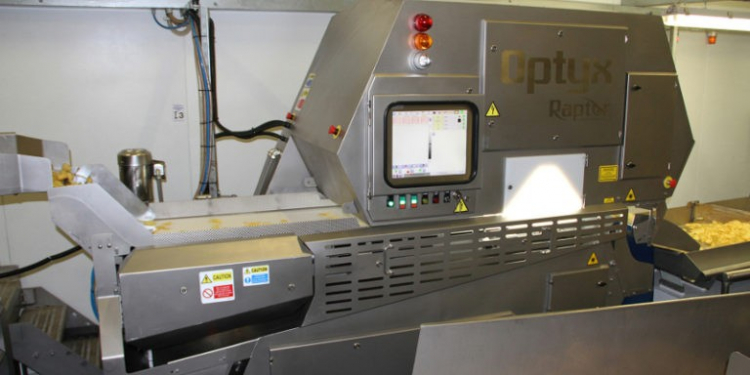Potato processors Keogh’s Crisps Ltd (Dublin Ireland) and Burts Chips Ltd (Roborough, England) have chosen Key Technology’s Optyx digital sorters working to satisfy the rising quality expectations of consumers and retailers around the world.
Identifying color and opacity, Optyx detects and removes defects such as oil-soaked soft spots, blisters, doubles and clumps as well as green spots, bruises, overcooked black spots and foreign material. Designed for production lines handling up to 1000 to 2000 kg of chips per hour, Optyx 3000 and Optyx 6000 sorters automate inspection to improve product quality and increase yields while reducing labor costs.
“We wanted to add a sorter to an existing production line. We considered two suppliers, comparing performance and the price of the system, and selected Key because of their outstanding track record. They have a lot of batch-fried sorters in the field, which are performing well, and their price was attractive,” said Tom Keogh, managing director of Keogh’s Crisps Ltd. “We measure this sorter’s success on the quality of our final product and the improvement in our production costs. We’re saving labor in QC because Optyx allowed us to reposition six people over two shifts to elsewhere in the plant.”

“For batch kettle chip producers like us, having chips stuck together as doubles is a serious problem because they’re not fully cooked. One soft center can turn a bag of chips rancid very quickly. We chose Key because they solved this problem better than others. Optyx removes foreign material and other defects too, but its ability to detect doubles is what made this sorter really stand out,” said John Joseph, Operations Director at Burts Chips. “Before we installed Optyx, we had to rely on manual inspection after our digital sorter to remove doubles. Now, thanks to Key, that’s no longer necessary.”
Keogh’s and Burts both selected Optyx sorters featuring cameras and lasers in combination to maximize the detection and removal of the widest range of foreign material and defects. Alternatively, Optyx can be configured with top- and bottom-mounted cameras to successfully sort batch-fried chips. By developing proprietary software algorithms that detect the challenging defects and foreign material that plague batch-fried chip manufacturers, Key is the clear leader in this market.
“We have unrivaled experience sorting batch-fried chips as well as continuous-fried chips. We maintain very close relationships with all our customers – from the smallest regional processors to large multinationals. This gives us a large knowledge base to draw on as we continually refine our systems and elevate the performance and customer value of our sorters,” said Marco Azzaretti, advanced inspection systems product manager at Key. “With our product handling expertise, we design and integrate conveyors that optimize sorting and achieve the gentlest handling for these fragile products. Our advanced algorithms differentiate doubles, which are rejected, from fold-over chips, which can be accepted. The combination of application-specific hardware and software intelligence helps maximize product quality and minimize waste.”
For ease of operation, KeyWare Application Software is designed specifically for each application, categorizing defects and foreign material in terms common to batch-fried chips. For processors that handle other products such as vegetable chips, Optyx can be equipped with multiple KeyWare application packs that enable product changeovers in seconds. “This is sophisticated technology, yet the operator interface is very simple to use,” noted Joseph.







